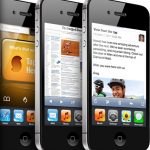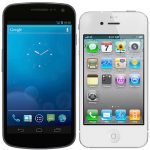Google+ puts iOS ahead of Android

May 9 is, in a way, a watershed day for Android -- and that's not necessarily a good thing. Many developers I communicate with repeatedly say they confront the same quandary: Android or iOS first? Maybe they choose to develop for iOS, only to ask: Android or iPad next? Google is a software developer, too, and this day put its priorities in order with a stunning iOS-first update. The new iPhone app for social network Google+ is stunning, breathtaking, immersive and makes the already great experience on Ice Cream Sandwich seem outdated -- although some of the best visuals migrate to iOS.
In a way, Google sets the wrong example for its development partners by putting iOS ahead of Android. But why not? The iOS install base is larger than Android (365 million to 300 million at last reveal); countless analyst surveys show that iOS device users are more connected and engaged; and fragmentation isn't a problem since the majority of the iOS install base is on the newest version (versus about 5 percent of Androids). Google wants Plus to succeed in a big way, so improving the experience everywhere should be a priority. But iOS first, for the next big thing, is the priority.
Android rises over fallen iPhone

I must really be asleep at the wheel. How could I have possibly missed this nearly week-old sales data: iPhone's fourth-quarter sales surge against Android was a blip on the screen. Chock it up to iPhone 4S launch combined with the saddest of sales motivators: Rock star's death halo, where album sales soar following an artist's death, or in this case iPhone following Apple cofounder Steve Jobs' tragic passing. Perhaps you have another reason. Regardless, sales don't lie.
Android smartphone OS market share, as measured in actual sales to people (and not shipments to stores), reached 61 percent during Q1 compared to a measly 29 percent for iOS/iPhone. That's a dramatic turnabout from fourth quarter when Android led by a narrower margin -- 48 percent to 43 percent. Still, like fourth quarter, the top-three selling smartphones were iPhone, iPhone and iPhone, as in 4S, 4 and 3GS in that order.
The mobile web is dead

Today, comScore released startling data about the mobile web, which bodes poorly for the browser. In March, the web browser accounted for just 18.5 percent of time spent online among US smartphone users. Mobile apps accounted for the rest. Now we know why Safari for iOS capabilities advance so sparingly: Apple sees it as irrelevant. Stated differently: Safari is to mobile what Internet Explorer 6 was to the desktop 10 years ago. Apps matter more to both developers.
Qualifying that one country does not the whole world make, the US data nevertheless foreshadows future trends and illuminates the past, demonstrating the wisdom of Apple's 2008 turnabout. When iPhone launched in June 2007, cofounder Steve Jobs couldn't say enough about Safari as a key user benefit. But by early 2008, Jobs and company shifted emphasis to the App Store, which launched in July of that year. In essence, Apple bet against the web after foaming at the mouth about open standards. Apps better fit Apple's "our way or the highway" approach to end-to-end hardware, software and supporting services. Only Google can save the mobile web now.
Android 4 share soars

I don't know how cellular carriers or device makers could move any slower serving Ice Cream Sandwich to their customers. Still, someone is making progress, seven months after Google formally unveiled the OS and six after the first device with it shipped. Android 4.0 share jumped dramatically from mid March to mid April, granted from a small base. It's about time.
This morning I wrote a mobile browser usage story and checked official statistics on Android usage, which is based on the number of devices connecting to Google Play during the pervious 14 days. That number: 2.9 percent. Hours later, when doing a second browser story -- on desktops -- I double checked, more as formality. To my surprise, Google updated the data as of today: 4.9 percent.
Google has lost control of Android

There was great news on the Android front this week. Samsung reported blow-out earnings, with smartphones -- the majority running Android -- accounting for nearly three-quarters of profits. Meanwhile comScore data spotlights the growing US Android tablet market. Additionally, Google started selling Galaxy Nexus direct, with no carrier contract, for $399. But all three share something in common -- what they foreshadow. Google has lost control of Android, and must swiftly act to regain it.
Forrester Research predicts that proprietary Android will surpass the Google Android ecosystem by 2015. Stated differently, Google's open-source mobile platform risks fracturing into multiple fatally fragmented Android ecosystems. Not one but many. There is little time for Google to demonstrate decisive leadership that can keep the ecosystem largely intact.
Don't cry for me, iPhone

Mark April 16th on your calendars as a day to remember -- and not because your taxes are due tomorrow, Americans. The weeks ahead promise cool ways to spend your refunds (assuming the tax man giveth back to you). Some of the best smartphones will arrive this week, with a blockbuster announcement coming in 17 days -- from Nokia and Samsung and another Samsung but with a big dash of Google sprinkled in. And Apple? Aaaaaahnt! Sound the game show buzzer. LTE iPhone is nowhere to be seen.
Coming April 22nd are not one, but two tasty 4G treats. As previously announced, Nokia Lumia 900 Windows Phone comes to AT&T all decked out in white -- yours for 100 bucks. Meanwhile, announced today, for an extra C Note, Sprint subscribers can get Galaxy Nexus along with fat $50 credit to put in their Google Wallet; the only real Google phone comes to the only national carrier with unlimited data. Looking ahead, Samsung today dispatched invites for a splashy May 3rd launch event -- it's the next Galaxy phone, baby. Don't cry for me, iPhone!
Uh-oh, iPhone fanboys

iPhone Idolators, please meet the Android Army. Now retreat! Android's share of the US smartphone market topped 50 percent in February, according to comScore. iOS gained share but trails considerably -- by like 20 points. You can have your iPhone, but many more Americans take Android. I'm waiting. What's your smarty-pants response to that, Apple apologists?
The findings butt against those from Nielsen -- a life raft of apology for those insisting iPhone will rule the world. Last week, Nielsen reported a huge surge in the number of new purchasers choosing iPhones compared to Android. For the three months ending in February, 48 percent of Americans who recently bought a smartphone, chose Android -- 43 percent iPhone, according to Nielsen. A year earlier, 27 percent of new acquirers chose Android versus 10 percent for iPhone.
Google isn't trying to save Android tablets but kill Kindle Fire

Rumors about Google's forthcoming tablet are increasing, which astounds me -- as they portray this as something new. Hey, Google already formally stated it would produce an Android tablet. The rumormongers have got the reasons wrong, too. Google isn't gunning for Apple but Amazon.
The retail giant is by far the biggest competitive threat standing before Android today. Amazon has customized Android, released its own hardware, ditched Google's browser for its own Silk, established a viable app store alternative to Google Play and created a curated user experience that rivals Apple's. In just one quarter, Amazon's Kindle Fire jumped ahead of all other Android tablets, putting it second to iPad. Every Kindle Fire sold is one more brick in the wall blocking the success of the broader Android ecosystem.
iPhone is unstoppable

Now there's a headline I never expected to write, particularly following "Android is unstoppable" nine months ago. But in the United States, at least, iPhone has nearly matched pace with Androids. Looks like the Apple apologists will get their day. After years of wrongly boasting iPhone's leadership over Androids, they might yet be right.
For the three months ending in February, 48 percent of Americans who recently bought a smartphone, chose Android -- 43 percent iPhone, according to Nielsen. Those numbers are up considerably for both, but iPhone surged to close the gap, following the release of the 4S in October. A year ago, 27 percent of new acquirers chose Android versus 10 percent for iPhone.
Switching from Android to iOS

Google’s Android and Apple’s iOS dominate the smartphone market with hoards of fans willing to fight tooth and nail for their platform of choice. What is it really like moving from one to the other? I found out.
I made the move from Android to an iPhone 4S over the weekend and reactions have, as expected, been mixed ranging from the disparaging “a downgrade” to “welcome to the club, you won’t regret it”.
Android rules the world?

Analysts love to make predictions. It's a no-risk gambit, because the forecasts are years away and nobody remembers if they're wrong. After thrice predicting that Windows Phone would beat out Apple's iOS by 2015, IDC has another for the same year: Android media tablet shipments will exceed iPad. By that reckoning, the firm predicts that Google's mobile OS will dominate the two major cloud-connected -- post-PC, if you insist -- device categories (the other being smartphones).
"As the sole vendor shipping iOS products, Apple will remain dominant in terms of worldwide vendor unit shipments", Tom Mainelli, IDC research director, says. "However, the sheer number of vendors shipping low-priced, Android-based tablets means that Google's OS will overtake Apple's in terms of worldwide market share by 2015. We expect iOS to remain the revenue market share leader through the end of our 2016 forecast period and beyond".
Apple sold 172 million 'post-PC devices' in 2011

Last year's iOS device sales reached 172 million, Apple revealed today during a special media event for the third generation iPad. CEO Tim Cook said "Post-PC devices" account for 76 percent of Apple revenues.
Apple ended 2011 with 315 million cumulative iOS device sales. A week ago, Google said that cumulative Android device sales had reached 300 million, with 850,000 activations per day.
Apple is winning the mobile platform wars

In October 2009, I explained why "iPhone cannot win the smartphone wars". Many of the reasons then still hold true today. But I wrote that analysis before Apple released iPad. So, 10 months later I followed up with "Apple can still win the mobile platform wars, but it won't be easy". Now, 18 months later, as Mobile World Congress starts in Barcelona, Spain, I claim: Apple is winning the mobile platform wars, but achieving ultimate supremacy won't be easy.
In August 2010, I observed: "Pundits already are predicting iPhone's death brattle before the great Android god. I wouldn't write off Apple just yet. The mobile wars are bigger than smartphones, as Apple already has shown". Little has changed since. Android apologists still predict victory over iOS, while ignoring fundamental platform gains that put Apple in front.
Who wins if Android and iPhone lose the smartphone wars?

Finally, an analyst firm comes clean about the cell phone market's volatility. Gartner and IDC continue to make outrageous predictions -- like Windows Phone as No. 2 smartphone operating system in 2015 -- despite many earlier forecasts being drop-dead wrong. But comScore says pretty much anything can happen and likely will.
That's a stunning assessment, considering Androids' and iPhone's 2011 success, as highlighted in comScore's "2012 Mobile Future in Focus" report. iPhone 4 -- right, not 4S -- was the top-acquired phone in the United States and five combined Euro countries (Germany, France, Italy, Spain and United Kingdom) last year. Android led among smartphone operating systems.
iPhone saves smartphone market

"Smartphone volumes during the quarter rose due to record sales of Apple iPhones". That's a helluva statement -- from Gartner's press release on Q4 2011 handset sales today. Emphasis on sales, which is what the analyst firm measures, not shipments into the channel like its competitors. One hundred-forty nine million smartphones sold globally during the quarter, up 47.3 percent year over year, 35.46 million from Apple.
Last month, Apple claimed 37.04 million iPhone sales, which, of course, really means shipments. Apple's stunning fourth quarter raised its ranking. The Cupertino, Calif.-based company passed LG to take third place in overall handset sales for all 2011 -- not just smartphones -- 5 percent to 4.9 percent share, respectively. In smartphones, Apple claimed top spot for the quarter and all 2011, with 23.8 percent and 19 percent market share, respectively. Apple sold 89.7 million handsets last year.
Recent Headlines
BetaNews, your source for breaking tech news, reviews, and in-depth reporting since 1998.
Regional iGaming Content
© 1998-2025 BetaNews, Inc. All Rights Reserved. About Us - Privacy Policy - Cookie Policy - Sitemap.